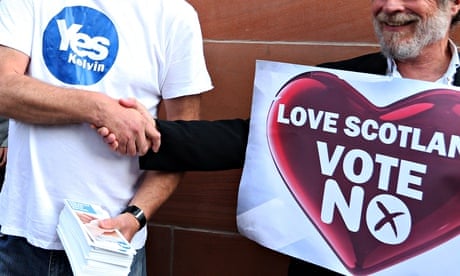My suspicion is that a lot of Scots voted no on Thursday with a wearied sense of disappointment that they weren't doing something far more exciting instead. The yes camp always looked cooler, younger, brighter; no doubt they had the better parties at night. It's hard to dress up a negative as anything other than the rejection of someone else's argument and those voting no must have felt like the grown-ups coming in to switch the lights on and whisper it's time to go to bed.
And on Friday things looked overwhelmingly finished: a 10-point margin, the defeated leader stepping down, crowds crying in Glasgow's George Square, the satellite trucks uncabled and driven home to London.
The main news bulletins were no longer packed with the opinion of ordinary men and women making the decision of their life. Instead, we returned to the old political tropes: a prime minister outside Downing street, backbenchers grousing on rolling news channels, financial experts delighted outside City buildings and Nigel Farage on College Green, standing outside the palace he wants to get in.
There can't have been a more sobering return to normality on Friday than David Cameron telling us that a major revolution was going to take place in politics over the coming months and that William Hague was the man to lead it.
The challenge, then, is to turn that Scottish no vote into something positive and enduring. For the other feeling I get as the debate dies down is that Scotland wanted this whole argument to mean something, irrespective of the result. A nation conversing with itself and about itself can be just as extraordinary as the decision it eventually makes. What Scotland has now bequeathed the UK is a fascinating demonstration of total political engagement in action.
The two numbers I take away from this week are not 55% or 45% but 84.5% and 16. 84.5% is the extraordinary turnout from Thursday, and 16 is the age from which those people could vote. That 84.5% mass movement could be the source of a greater political upset than all the discussions about constitutional conventions and decentralised government. Though it's right that Westminster debates how its power should be properly wielded, 84.5% reminds us that this discussion now goes way beyond Westminster and back to the electorate it serves.
This is a public discussion about politics, not just one for constitutional experts. The yeses and the nos came out in force together, so it wasn't just nationalism that demanded to be heard – it was almost an entire people. In the weeks leading up to the vote, TV cameras caught arguments between strangers on street corners locking horns over the Barnett formula and the decommissioning of Trident. Families spent breakfasts pulling apart the pitfalls and promises of devomax.
On both sides of the referendum, people were energised by an astonishing proposition: take everything you're used to in politics and imagine you could put it to one side and start again. At that, the people did the talking and politicians were forced to listen.
And the extension of the vote to 16- and 17-year-olds was a triumph. As someone who went through the nerve-shredding tradition of Scottish inter-school debates, I wasn't surprised to see a lot of confident speakers and campaigners aged 16 and 17, but what was thrilling was how energised that whole generation had become, how they asked all the most penetrating questions, how forensic was their analysis of what politicians had to say and how they challenged parents, brothers and sisters to do the same. Their discussions were more gripping than anything a fan of party representatives on stools could ever muster.
View our political landscape through the eyes of a 16-year-old and see how cumbersome and frankly barking mad it now looks. It's not just the men and women in massive rosettes standing outside brick scout huts every couple of years collecting polling cards. It's the whole show.
In a world where we can now source anything online, download anything we want to see from any country in the world, and where we can pick and choose individual tracks, whatever programme, whichever individual item we need from whatever outlet – in this complete shopping basket world, they must be asking why on earth they're being forced to pick one party and its entire list of policies, rather than their own playlist of ideas. It simply doesn't make any kind of sense.
It is no surprise that even though we're one of the most stable societies in the world and one of its most uncorrupt, we feel massively disconnected from the discourse of those we elect. They speak differently, they gesture unlike anyone in real life, they move from politics degree to parliamentary membership in the time it takes to wire a plug. Their speech patterns, their unhesitating use of phrases such as "raft of initiatives" and "sustainability clusters" fails to penetrate human ears. Politicians have trapped themselves in their own speech bubble. The policies they formulate don't feel like they've come from any ordinary discussion.
I think the moment I felt that politics went through a looking glass was in the 2005 general election campaign. Tony Blair, the defending prime minister, was asked if Labour was going to renew Britain's nuclear deterrent and, more pressingly, why there was no clear answer to that question in his party manifesto. His answer was genius. "That's not a question for now. That's a question for the next parliament."
Step back and parse for a second the verbal errors by which democracy as we know it is casually denied in that sentence. Democracy normally works like this: people tell you what they'd do if they were in power and you vote for the ones you agree with. Under the Blair doctrine, however, it seems you vote people into power first and then you might find out what they want to do at a later stage.
It's no surprise that there is steadily building up a complete and utterly bamboozled look of awed incomprehension on the public's collective face about what on earth politicians mean by what they're saying.
They talk like the priests of an oriental church, in a Coptic language based on scripture we're too uneducated to understand.
For far too long, the policy ideas and proposals to govern our country have come from party committees to which we don't belong and in thinktanks hidden from normal eyes. The absolute necessity of the bedroom tax, for example, has never been explained to any earthling using ordinary words.
If you're ever in Edinburgh, I urge you to go to the Scottish parliament building. Yes, you can go in. The building is open all year round, for the public to wander through. In the summer, during Edinburgh's Festival of Politics, I've taken part in public discussions and debates in the main council chamber. The building is there for the public's use. Switch to the Palace of Westminster and you're challenged by an edifice that says: "Stand back. This is not for you. Keep out." It's an intensely private building, whose main message is that what's going on inside it is too important for standard eyes.
Disengagement from the public has been a conscious tactic of the political parties. They have concentrated aggressively on a minority in the middle, the 100,000 or so who make all the difference in key marginal constituencies. Forgotten now are people at the edges, the non-voters, the marginalised, the claimants. They won't vote, so why bother canvassing them? In fact, why bother targeting any policies at them? Far better to demonise them in the eyes of those who will vote.
The truth is, conventional politics has simply fallen out of use in front of us, so slowly at times we may not have noticed it. The percentage of people voting in general elections has declined by as much as 30 percentage points since the 1950s. For the past two general elections, more people stayed at home and didn't bother than voted for the parties that went on to form the government. Meantime, party membership has collapsed and party loyalty has gone forever.
Across the UK, opinion polls have for years now been pointing to hung parliaments as Labour and Conservative share of the vote has dropped from mid-40s to mid- and sometime low 30s. The current system by which Westminster conducts itself is unsustainable. No surprise, then, that people look for alternatives.
But 84.6% tells us that people aren't disengaged from politics. It's just that it is now personal politics that captivates us. People go on marches, they volunteer for pressure groups, they organise petitions, they connect and mobilise online and come out and vote for their country's future.
This new way of doing politics isn't going to change and if politicians ignore these new political constituencies, they'll live to regret it. Fortunately, we can now use social media to remind them.

